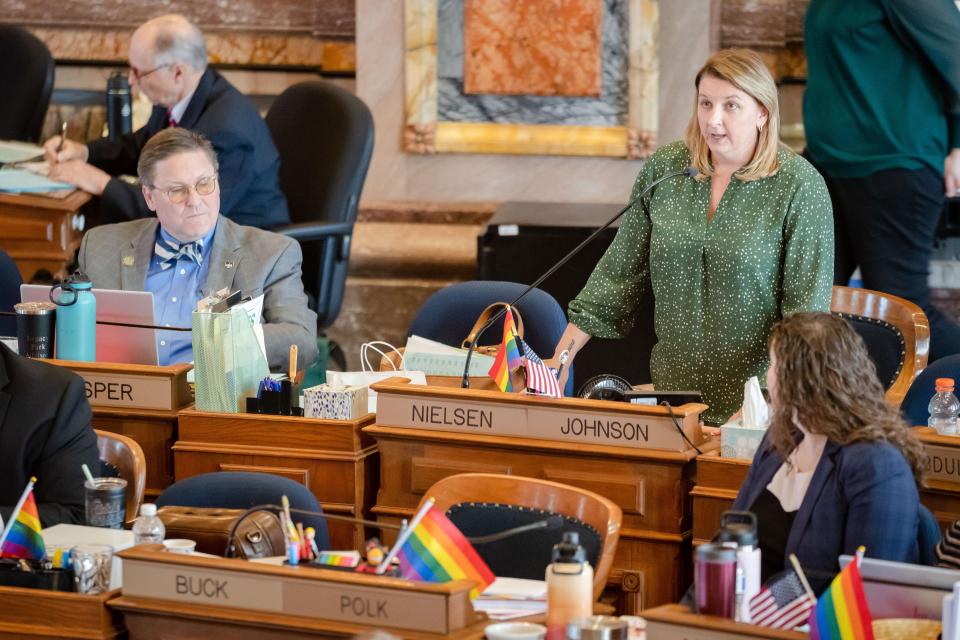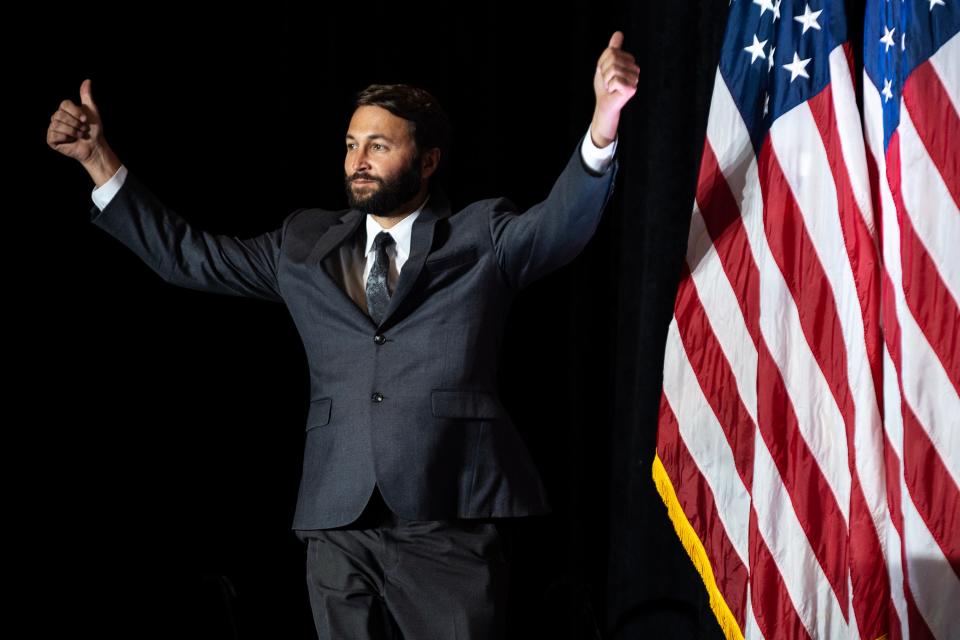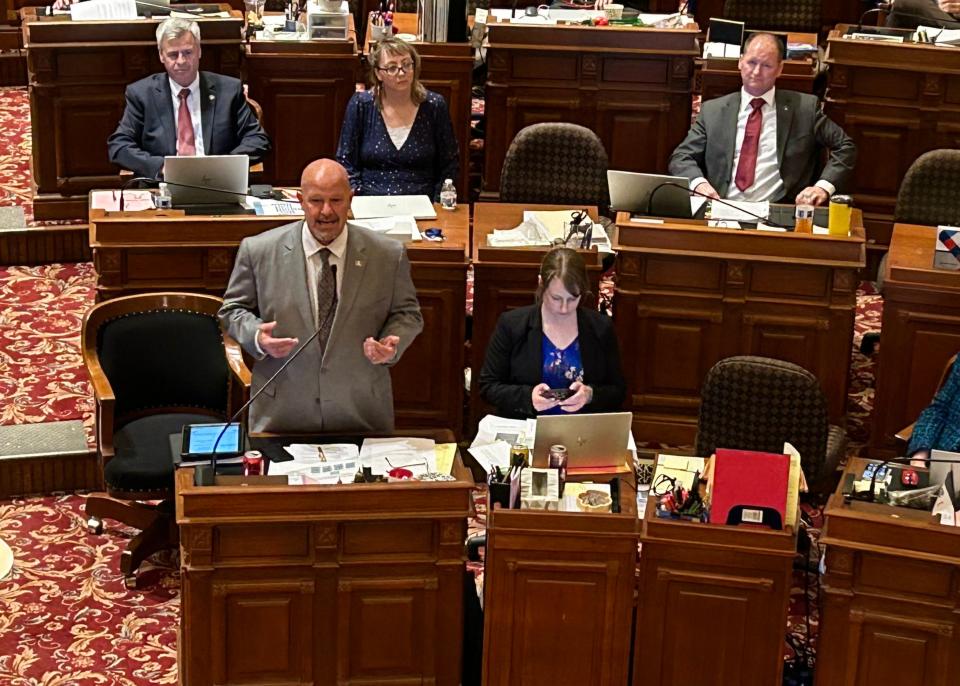Democrats walk out as GOP advances election bill that helps keep Donald Trump on ballot
- Oops!Something went wrong.Please try again later.
Two Democrats walked out of a House subcommittee meeting this week on an election bill that would make it more difficult for Iowans to challenge Donald Trump's place on the 2024 general election ballot.
The wide-ranging election bill would allow federal candidates convicted of felonies to appear on Iowa's ballot, ban ballot drop boxes, ban ranked-choice voting and change the deadline for when absentee ballots must be returned to a county auditor to be counted.
At a House subcommittee meeting Tuesday, Rep. Bobby Kaufmann, R-Wilton, interjected as Rep. Amy Nielsen, D-North Liberty, was speaking.
"Stop interrupting me," Nielsen said.

"I didn’t interrupt you," Kaufmann responded. "This is my subcommittee and I will refer to whoever I want to refer to whenever I want to refer to them. You don’t run this meeting, Rep. Nielsen."
As Kaufmann gave his closing comments a few moments later, Nielsen said, "you don't need me," and walked out of the room, followed by her colleague, Rep. Adam Zabner, D-Iowa City.
Both Democrats returned to speak to reporters and offer criticisms of the bill after the subcommittee meeting concluded.
"It takes quite a lot of nerve to call a bill an election-integrity bill when the point of the bill is to let felons run for office," Zabner said. "And particularly someone like Donald Trump, who has so little integrity."
More: Iowa Secretary of State's bill would bar 14th Amendment ballot challenge for Donald Trump
Kaufmann, who worked for Trump's presidential campaign in Iowa as a senior adviser, said it has "nothing to do" with Trump and that his motivation for the bill is "maintaining the highest level of election integrity" in Iowa.

"It is not our job to decide who’s on the ballot," Kaufmann said. "It is the voters’ job and it’s arrogant, frankly, for us to think that we should overrule what they choose to do, whether that’s a D, an R, an independent, a Libertarian or Green Party or anyone else for that matter."
The Iowa House and Senate advanced identical versions of the bill, House Study Bill 697 and Senate Study Bill 3161, through subcommittees this week. Both chambers are set to consider the bills at the committee level before the end of the week.
How would challenges to Donald Trump's candidacy be limited in Iowa?
The Iowa bill would limit the grounds for any challenges to a presidential candidate in the general election.
Political parties are required to submit a certificate with the names of their presidential and vice presidential candidates to the Iowa Secretary of State's office 81 days before the general election.
Under the bill, challenges to presidential candidates would be limited to whether that certificate meets all the legal requirements.
If the bill in Iowa passed, Iowans could still challenge Trump's eligibility in court, but not through the state's law for objecting to candidates appearing on the ballot.
Candidates for other federal offices, like Congress, could only be challenged on the candidate's age, residency, citizenship and whether their nominating papers meet all the legal requirements.
Requirements for federal candidates are set out in the U.S. Constitution and states do not have the authority to place additional requirements on federal candidates as they can with candidates for state office.
Candidates for Congress and the presidency would no longer have to sign an affidavit attesting that they know they are disqualified from holding office if they have been convicted of a felony. That means they could appear on Iowa's ballot even if they have been convicted of a felony.
Trump faces 91 felony charges in four criminal cases around the country. And he has faced challenges to his candidacy under Section 3 of the U.S. Constitution's 14th Amendment that bars officials from holding office again if they "have engaged in insurrection or rebellion" against the United States.
"We’re not going to become a country of 50 different laboratories for right-wing and left-wing activism," Kaufmann said. "The voters who choose a president need to be the ones who decide it, not the Legislature."
Zabner called it "unbelievable" that Kaufmann, who worked for the Trump campaign, is managing the bill.
"I just think Iowans need to let that set in," he said. "Someone who worked for the Trump campaign is here passing a law specifically to help Donald Trump."
Absentee ballots could be mailed to voters sooner, but would have to be returned sooner
The bill would change the deadline for returning mail-in absentee ballots, requiring them to be delivered to the county auditor's office by close of business on the day before Election Day in order to be counted.
Currently, absentee ballots are accepted as long as they arrive by the time polls close on Election Day.
County auditors would also be allowed to begin mailing absentee ballots to voters two days earlier, starting 22 days before Election Day rather than 20 days under current law.
Iowa Republicans have steadily shortened the state's early voting window from 40 days to 29 days down to 20 days since taking full control of state government in 2016. In-person early voting would remain at 20 days under the bill.
Sen. Jason Schultz, R-Schleswig, who chairs the Senate State Government Committee, said there are differences of opinion among Republicans about the length of the early voting period.
"I guess my goal is to find a place where we can stay long term," he said.

Sen. Janice Weiner, D-Iowa City, said she would support letting county auditors send out mail-in absentee ballots 25 days before an election so that voters who requested a ballot by mail would already have it by the time in-person early voting began.
"That would save a lot of folks from coming in for early voting and saying, 'I don’t have my ballot yet,'" she said.
Counties would also be required to send voters three envelopes with every absentee ballot. While some counties do use a three-envelope system, some use just two envelopes when handling absentee ballots.
Adams County Auditor Becky Bissell, who chairs the Iowa State Association of County Auditors, said it would be difficult for counties to purchase all new envelopes before the 2024 election.
Voters would be required to mark their absentee ballots with a four digit voter verification number.
Ballot drop boxes would be banned in Iowa
County auditors would no longer be able to set up ballot drop boxes for Iowans to return their absentee ballots, under the bill.
Bissell said drop boxes are saving counties in Iowa several thousands of dollars in return postage costs thanks to voters choosing to use the drop box rather than the U.S. Postal Service. She said drop boxes also provide a more accessible option for voters with disabilities or limited mobility.
"Drop boxes provide an opportunity for voters to ensure their ballot is received in time without relying on uncontrollable external factors such as the Postal Service," she said.
Weiner said drop boxes are convenient for voters.
"Think somebody with a small child in the car," she said. "Think of an elderly person or someone who is mobility challenged and so forth who can drive up and drop it in rather than having to get out and go in."
A wide-ranging 2021 election law allowed county auditors to set up one drop box at the auditor's office, under video surveillance.
Kaufmann called ballot drop boxes "a COVID product" and said "they're no longer necessary."
"It’s unnecessary when there’s a drop box in every city, in every county in the state of Iowa," he said. "They’re blue and they say 'USPS' on them."
Bill would ban ranked-choice voting in Iowa (it's already not allowed)
Ranked-choice voting would be explicitly banned under the bill, although a spokesperson for the Iowa Secretary of State's office said Iowa law already prohibits the practice.
Several people at Monday's Senate subcommittee spoke up in favor of ranked choice voting, which involves voters ranking each candidate in order of preference. If the voter's first-choice candidate failed to win support, their vote would be transferred to their second-choice candidate and so on until one candidate received a majority.
David Gion, executive director of Better Ballot Iowa, a group that advocates for ranked-choice voting and other election changes, said Iowans are interested in the option.
"Just keep the conversation going," he said. "There is no reason to stifle the conversation and ban ranked-choice voting today. Let’s have a healthy conversation."
Karen Person, vice president of the League of Women Voters of Metro Des Moines, said ranked-choice voting would save taxpayers the cost of paying for runoff elections and could encourage more moderate candidates.
"Ranked-choice voting may encourage candidates to work for the common good," she said. "Candidates in an election using ranked choice voting may be more likely to support the issues that benefit a broad range of citizens, rather than working for special interest groups that fund their campaigns."
Speaking after Tuesday's House hearing, Kaufmann said he and other Republicans don't like ranked-choice voting.
"Ranked-choice voting is political welfare for people that can’t win elections, in my opinion," he said. "I cannot stand ranked-choice voting."
Stephen Gruber-Miller covers the Iowa Statehouse and politics for the Register. He can be reached by email at sgrubermil@registermedia.com or by phone at 515-284-8169. Follow him on Twitter at @sgrubermiller.
This article originally appeared on Des Moines Register: Iowa election bill limits challenge to Trump, bans ballot drop boxes

